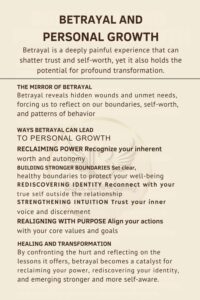Betrayal and Personal Growth Are An Opportunity For Turning Deep Pain Into Power.
Betrayal is a wound that cuts deep.
It can shatter your sense of trust, dismantle your worldview, and leave you questioning your worth. Whether it comes from a partner, friend, family member, or trusted guide, betrayal is one of the most painful emotional experiences a person can endure.
But beneath the devastation lies something else:
An invitation.
Because as excruciating as it may be, betrayal is also a portal to personal growth.
Not because you deserved the pain—you didn’t.
But because the hurt demands reflection, and reflection opens the door to transformation.
🔥 The Duality of Betrayal: Breakdown Before Breakthrough
Betrayal leaves you raw. It deconstructs everything you thought was safe and true. But that very breakdown also clears away illusions, making space for truth.
In the wake of betrayal, you may find yourself asking:
-
Who was I in that relationship?
-
Where did I abandon my own needs?
-
What parts of me need deeper protection or healing?
-
What do I want and deserve moving forward?
These aren’t easy questions—but they’re sacred ones.
🪞 The Mirror of Betrayal: What It Reveals
Betrayal forces us to look at ourselves with unfiltered honesty. Not to blame ourselves, but to take back the power we may have unknowingly given away.
It reveals:
-
Hidden patterns of self-sacrifice or people-pleasing
-
A lack of boundaries rooted in fear or unworthiness
-
Where we’ve outsourced our identity, safety, or self-esteem
-
Unmet emotional wounds from the past resurfacing for healing
The pain becomes the teacher.
The rupture becomes the reason we return to ourselves.
🌱 5 Ways Betrayal Can Lead to Personal Growth
1. Reclaiming Power
You learn that your worth is not tied to someone else’s choices. Reclaiming your voice, agency, and truth becomes an act of empowerment.
2. Building Stronger Boundaries
Where you once said “yes” to things that didn’t honor you, you now learn to say “no” with clarity and conviction.
3. Rediscovering Identity
Outside of the roles and dynamics that defined you, you begin asking: Who am I now? This self-inquiry often leads to a more authentic version of yourself.
4. Strengthening Intuition
You begin trusting your gut. You reflect on the signs you ignored or minimized, and learn to listen more deeply to your inner guidance system.
5. Realigning With Purpose
Pain can clear the path to your purpose. Often, those who experience deep betrayal are called to healing work, advocacy, creativity, or spiritual exploration.
💎 Healing Is the Path to Wholeness
Growth doesn’t mean you forget what happened. It doesn’t mean you justify the betrayal or rush to forgiveness.
It means you choose to rise, anyway.
You begin to:
- Forgive yourself for what you didn’t know
- Release the version of you that tolerated too much
- Invest in your emotional and spiritual well-being
- Step into relationships that match your newfound truth
🌕 Final Reflection: Betrayal Is a Catalyst, Not a Conclusion
You didn’t choose the betrayal. But you can choose what happens next.
Let it burn away what no longer serves you. Let it shape you into someone wiser, stronger, and more rooted in self-love than ever before. Let it be the reason you build a life—not in reaction to pain, but in alignment with your deepest truth.
Because through the ashes of betrayal,
you rise.
Remember:
Every breath, every action, every moment is an opportunity to walk your spiritual path with grace.
Stay connected, stay committed, and trust that your practice — even amidst the beautiful chaos of life — is leading you exactly where you are meant to be.
Dear Readers,
Thank you for joining me on this journey. I hope you found today’s insights valuable and inspiring.
Check Out This Month’s Happenings!
May your journey be gentle, your spirit be bright, and your world be filled with boundless light, love, and levity.
Namaste.
Meg
@LightLoveLevity





